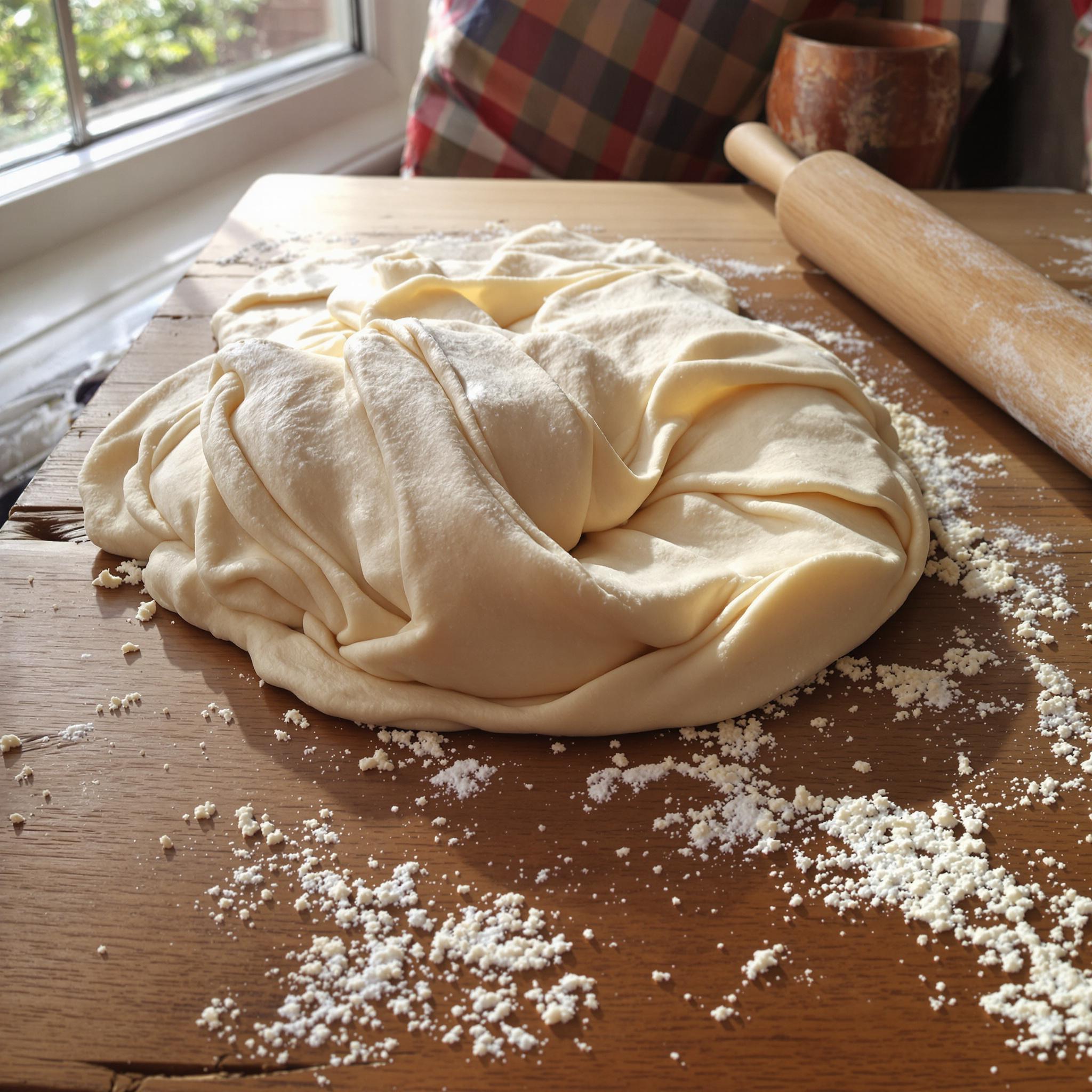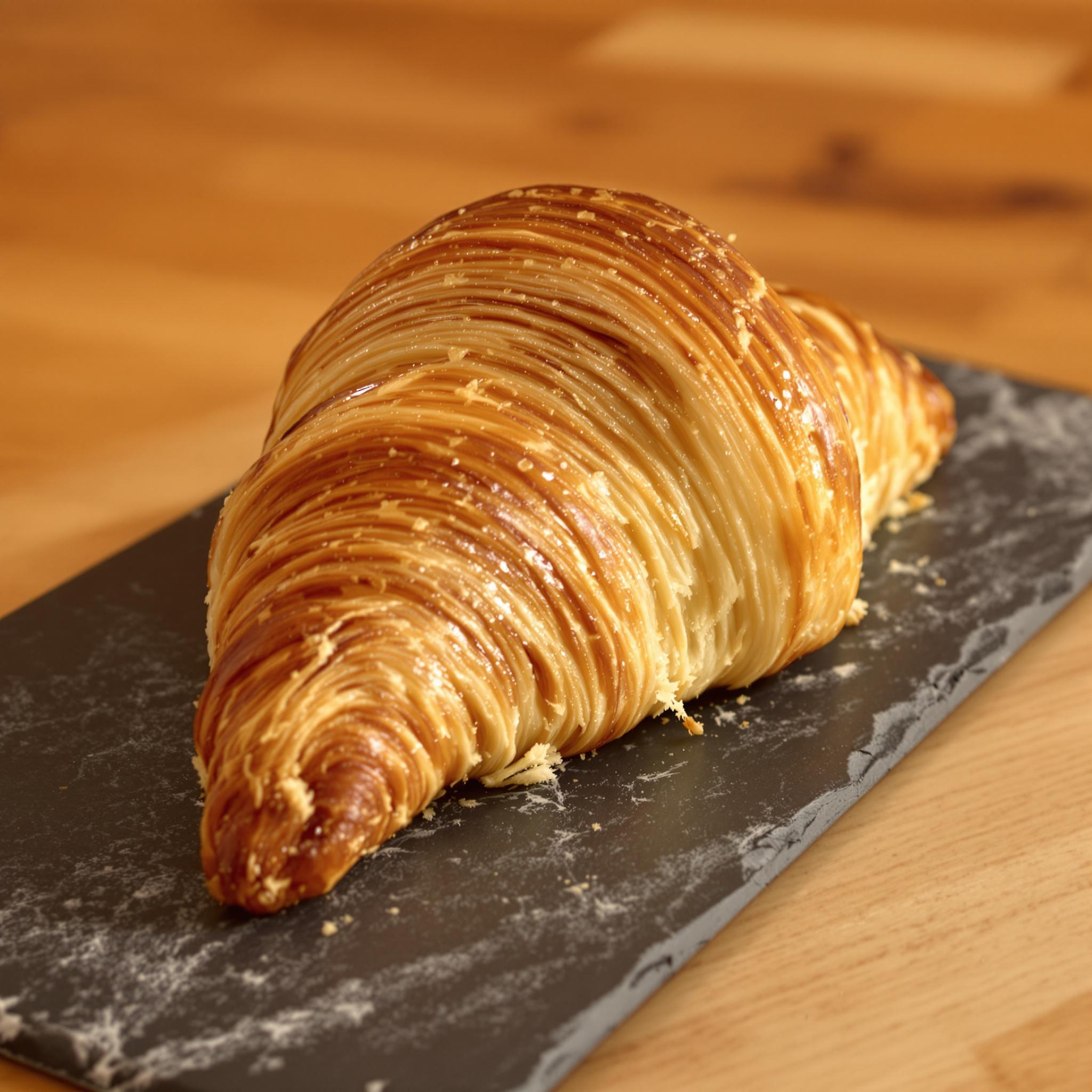Introduction to Flaky Croissant Dough
Flaky croissant dough feels like magic. The buttery layers just melt in your mouth, leaving you wanting more. I first made it on a rainy weekend. Watching the dough rise and turn golden was so rewarding. Whether you’re new to baking or a pro, this dough is worth the effort.
The Origins of Croissants
Croissants have roots in Austria and France. They started as simple crescent-shaped rolls. French bakers added buttery layers, creating the croissant we love today. Now, you can find sweet and savory versions. This recipe brings back the classic charm with a homemade touch.
Why You’ll Love This Recipe
This flaky croissant dough is special for many reasons. It’s versatile—you can make sweet or savory treats. Your kitchen will smell amazing as the butter and yeast cook. The texture? Light, airy, and crisp all at once.
Perfect Occasions to Prepare Flaky Croissant Dough
These croissants are great for brunch gatherings or holiday breakfasts. Perfect for lazy Sunday mornings or as gifts for friends. Pair them with coffee for a cozy snack.
Ingredients for Flaky Croissant Dough
- All-purpose flour
- Unsalted butter
- Sugar
- Salt
- Yeast
- Milk
- Water
Substitution Options
No milk? Use almond or oat milk. Swap sugar with honey for a natural twist. For vegans, try plant-based butter and skip yeast by using sourdough starter.
Step 1: Mixing Dry Ingredients
In a large bowl, mix flour, sugar, salt, and yeast. Whisk until even. Pro tip: Measure carefully for best results.
Step 2: Adding Warm Liquids
Warm the milk and water—just warm, not hot—to wake up the yeast. Pour into the dry mix. Stir until a shaggy dough forms.
Step 3: Kneading the Dough
Knead the dough on a floured surface until smooth and elastic. This builds gluten for structure. Let it rest under a towel for an hour to rise.
Step 4: Layering Butter
Roll out the dough and add cold butter in thin sheets. Fold and roll several times to create layers. Chill between folds to firm up the butter.
Step 5: Shaping and Baking
Shape the dough into crescents or rectangles. Bake until golden brown. Keep an eye on them to avoid burning. Your kitchen will smell amazing.
Chef’s Tip
For extra flakiness, chill the dough before shaping. Cold butter ensures distinct layers during baking.
Time Required for Flaky Croissant Dough
- Prep time: 30 minutes
- Rising time: 1 hour
- Chilling time: 2 hours
- Baking time: 20 minutes
- Total time: About 4 hours
Nutritional Information
Per serving (1 croissant): Calories: 250, Protein: 5g, Fat: 12g, Carbs: 30g.
Extra Information
Fun fact: Croissants are named after their crescent shape, which symbolizes the moon.
Necessary Tools
- Rolling pin
- Mixing bowls
- Parchment paper
- Oven
Storage Instructions
Store leftover croissants in an airtight container. They stay fresh for 2 days at room temperature. For longer storage, freeze them wrapped in foil. Reheat in the oven for crispiness.
To freeze, place cooled croissants in freezer-safe bags. Label with the date. Thaw overnight in the fridge before reheating.
Avoid microwaving—they get soggy. Instead, warm them in the oven at 350°F for 5 minutes.
Tips and Tricks
- Use high-quality butter for better flavor.
- Keep your workspace cool to prevent melting butter.
- Don’t rush chilling steps; patience pays off.
Serving Suggestions
- Serve plain with jam or honey.
- Stuff with ham and cheese for a savory twist.
Healthier Alternatives
Looking for lighter options? Try these variations:
- Whole wheat croissants: Replace half the flour with whole wheat.
- Low-fat version: Use reduced-fat butter.
- Vegan croissants: Substitute butter and milk with plant-based alternatives.
- No-sugar option: Skip sugar entirely.
- Gluten-free: Use gluten-free flour blend.
- Herb-infused: Add rosemary or thyme for a savory touch.
Common Mistakes to Avoid
Mistake 1: Overworking the Dough
Over-kneading makes the dough tough. Stop when it feels smooth and elastic. If it’s sticky, let it rest.
Mistake 2: Skipping Chilling Steps
Skipping chilling leads to melted butter and poor layering. Always chill between folds for crisp layers.
Mistake 3: Using Warm Butter
Warm butter blends into the dough instead of forming layers. Keep it cold throughout preparation.
Frequently Asked Questions
Can I make croissants ahead of time?
Yes! Prep the dough a day in advance. Store it in the fridge overnight, then bake fresh in the morning.
What type of flour works best?
All-purpose flour gives the right balance of strength and tenderness. Bread flour works too but may make chewier croissants.
How do I know if my yeast is active?
Dissolve yeast in warm water with a pinch of sugar. If it bubbles within 10 minutes, it’s good to go.
Do I need a stand mixer?
No, you can knead by hand. A stand mixer speeds things up but isn’t essential.
Why are my croissants dense?
Dense croissants happen from insufficient rising or overhandling the dough. Proof properly and fold gently.
Can I freeze unbaked croissants?
Yes! Freeze shaped croissants on a tray, then transfer to bags. Bake directly from frozen, adding a few extra minutes.
How long do croissants last?
Freshly baked croissants taste best within 2 days. Freeze for longer storage.
What temperature should I bake at?
Bake at 400°F for about 20 minutes. Adjust based on your oven.
Can I add fillings before baking?
Yes, but avoid wet fillings, which can make the dough soggy. Brush edges with egg wash to seal.
Why did my layers disappear?
Layers vanish if the butter melts into the dough. Keep everything cold and handle gently.
Conclusion
Flaky croissant dough takes effort, but the results are worth it. With practice, you’ll master perfect pastries. Experiment with flavors and share your creations with loved ones!

Equipment
- Rolling pin
- Mixing bowls
- Parchment paper
- Oven
- Whisk
Ingredients
- 500 g all-purpose flour
- 250 g unsalted butter cold
- 50 g sugar
- 10 g salt
- 10 g yeast active dry yeast
- 200 ml milk warm
- 50 ml water warm
Instructions
- In a large bowl, mix flour, sugar, salt, and yeast using a whisk until well combined.
- Heat milk and water until warm—not hot—to activate the yeast, then pour into the dry mix. Stir until a shaggy dough forms.
- Knead the dough on a floured surface until it becomes smooth and elastic.
- Roll out the dough and add cold butter in thin sheets. Fold and roll several times to create layers.
- Shape the dough into crescents or rectangles and bake until golden brown.


